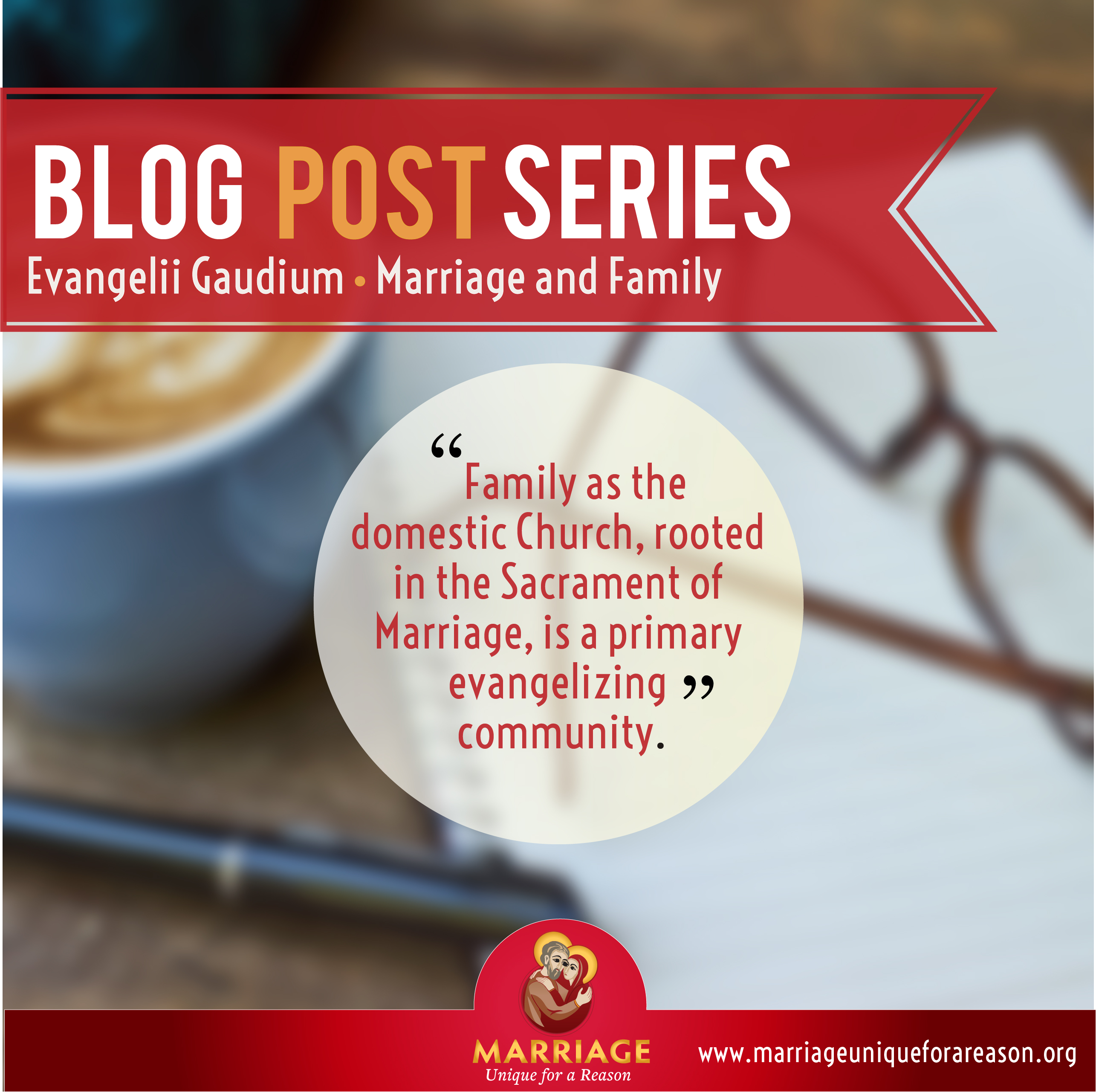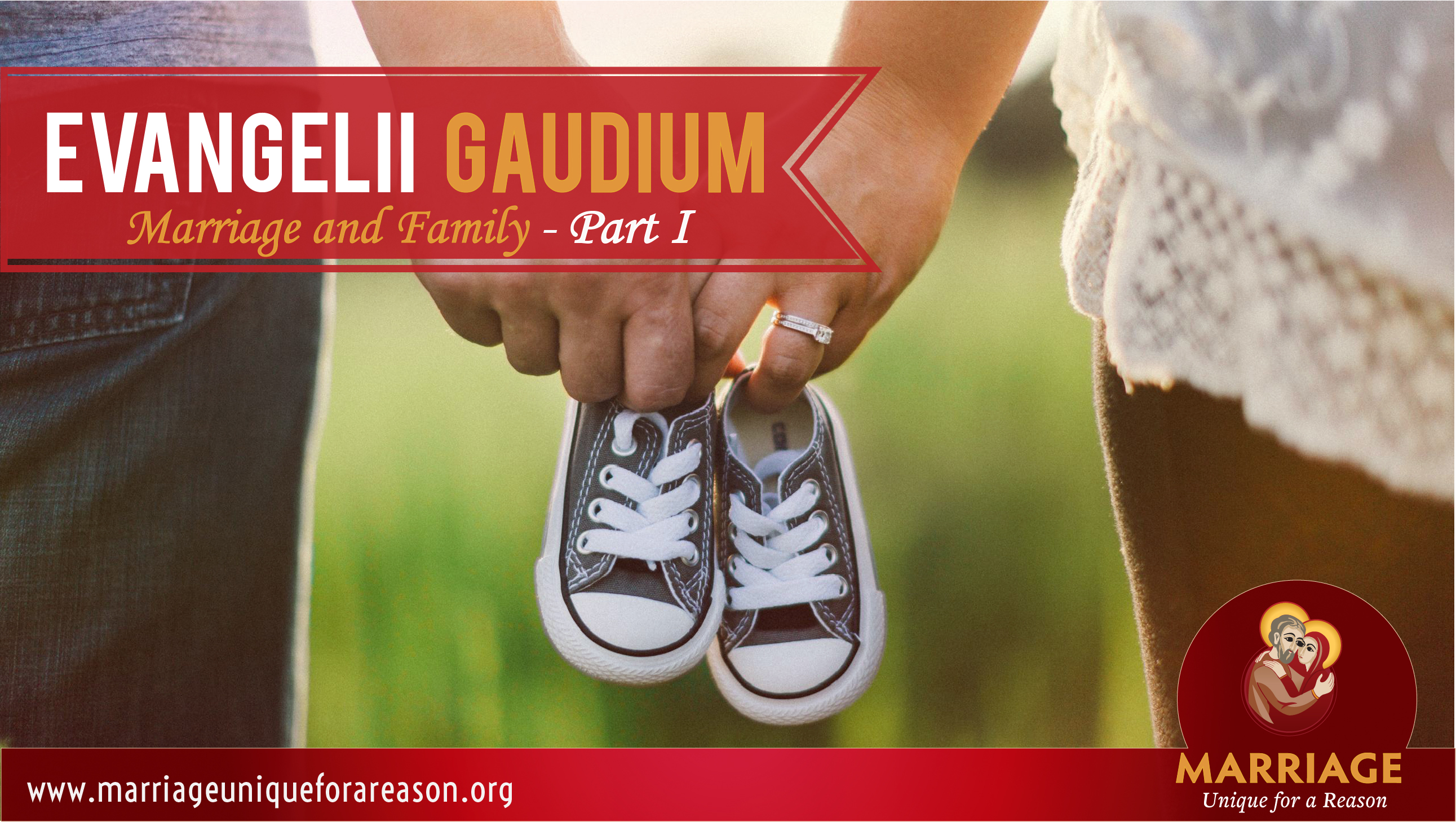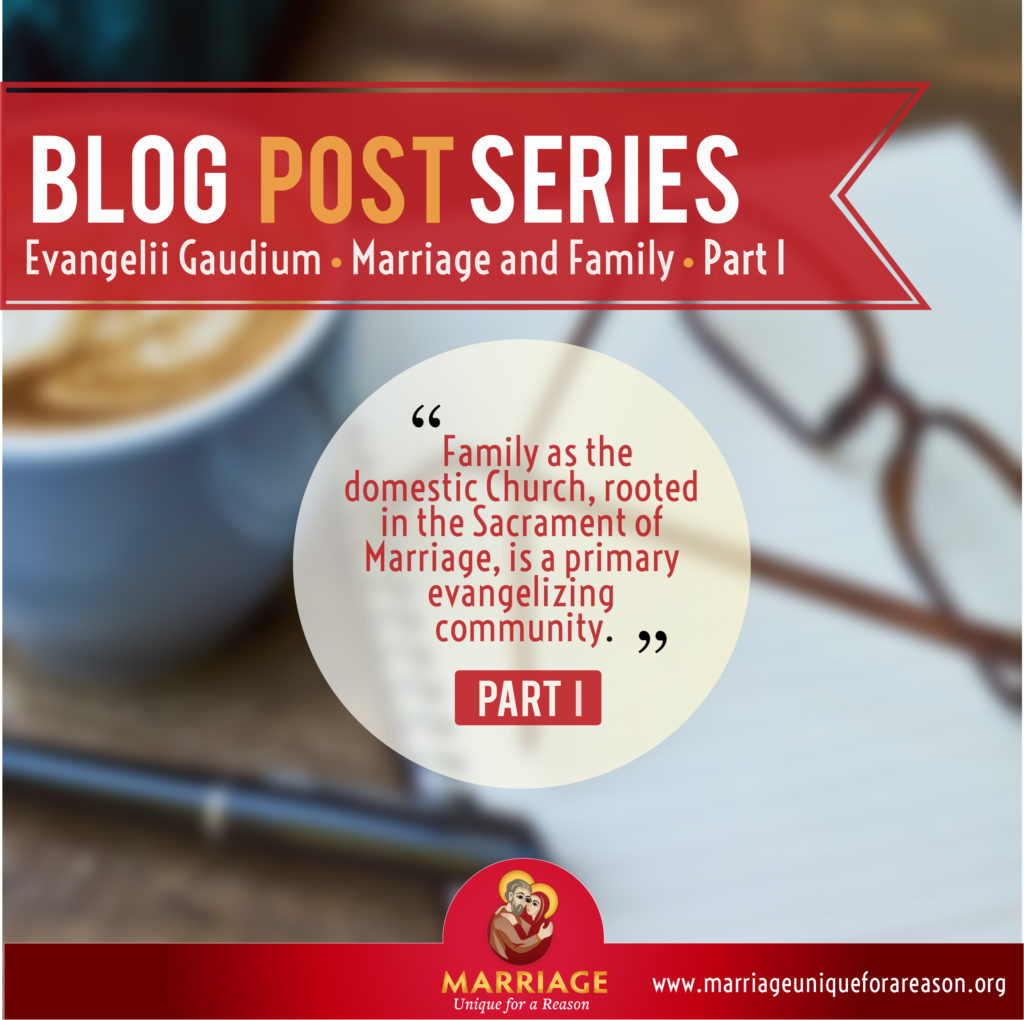Evangelii Gaudium: Mary, Mother of Evangelization
 Lessons from Evangelii Gaudium #20
Lessons from Evangelii Gaudium #20
Pope Francis’s Apostolic Exhortation on the proclamation of the Gospel in today’s world, Evangelii Gaudium or “The Joy of the Gospel,” has many points that are relevant to the work of Marriage: Unique for a Reason. This series will explore some of these themes and apply Pope Francis’s words to the culture of marriage and family in the United States.
Mary, Mother of Evangelization
Pope Francis ends his apostolic exhortation by turning to Mary, who is our model and our help in evangelization. If we reflect on Christ’s dying words in the Gospel of John, “Here is your mother” (Jn 19:27), we see that in this most important moment, in “the supreme hour of the new creation,” Christ turns our attention to Mary (no.285). He offers us his mother to be our own, as “an icon of womanhood” to intimately accompany the Church, which includes each one of us (no. 285).
The Holy Father reminds us of the myriad roles that Mary plays in the life of the Church. She is the “handmaid of the Father who sings his praises…the friend who is ever concerned that wine not be lacking gin our lives…the woman whose heart was pierced by a sword…a sign of hope…the missionary who draws near to us…a true mother” (no. 286). In these many ways and more, Mary is with each of us, sharing our history, struggles, and our mission. What a wonderful gift Christ has given us! Her maternal comfort is a wellspring of strength and hope for all who are weary and suffering.
As the one who allowed herself to be completely open to and guided by the Holy Spirit, Mary is our model of perfect faith; she is “the Mother of the Church which evangelizes” (284). She accompanies us as we enter more deeply into the mystery of faith—a journey often riddled with moments of “aridity, darkness, and even fatigue” (no. 287). She herself, Pope Francis tells us, often experienced these things, as she “lived in intimacy with the mystery of her Son, and went forward in her pilgrimage of faith” (no. 287). As we strive to live in that same intimacy, she offers us the comfort of her maternal presence especially through the moments of darkness and uncertainty.
In gratitude for the gift of His mother that Christ gave us, we must keep love and reverence for Mary alive in our homes, without whom “we could never truly understand the spirit of the new evangelization” (no. 284). We must look to her for the form that evangelization should take, especially within our family lives. She has shown us that justice and tenderness, contemplation and work, must always be held together. When we live in this way, looking to our Mother for guidance, our homes with the entire Church can help to open the way “to the birth of a new world” (288).
Archive
Evangelii Gaudium: Intercessory Prayer
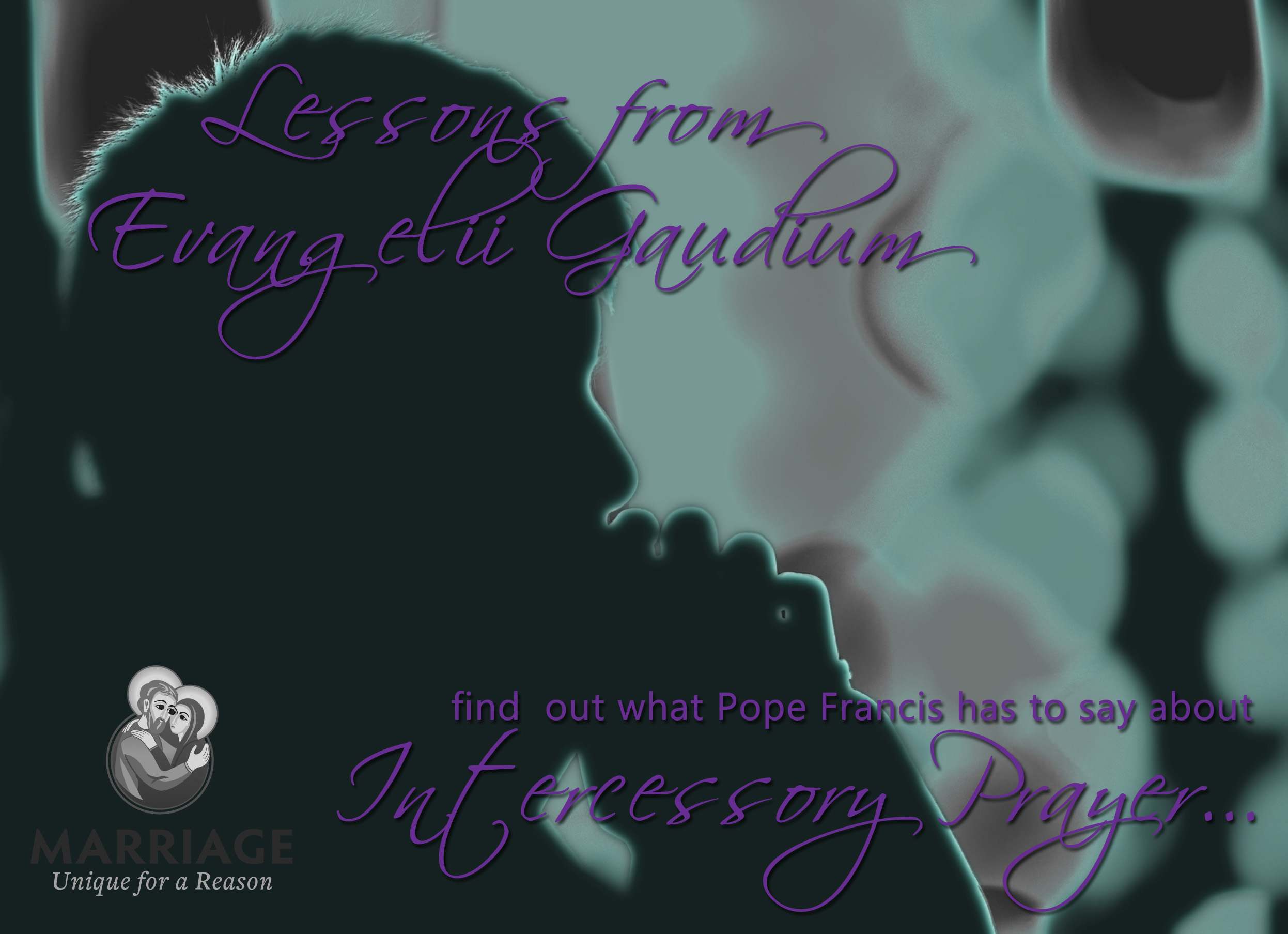 Lessons from Evangelii Gaudium #19
Lessons from Evangelii Gaudium #19
Pope Francis’s Apostolic Exhortation on the proclamation of the Gospel in today’s world, Evangelii Gaudium or “The Joy of the Gospel,” has many points that are relevant to the work of Marriage: Unique for a Reason. This series will explore some of these themes and apply Pope Francis’s words to the culture of marriage and family in the United States.
Intercessory Prayer (281-283)
While there are many ways to live out our prayer lives, Pope Francis calls our attention to one particular form of prayer: Intercession. The Catechism of the Catholic Church defines Intercessory prayer as “a prayer of petition which leads us to pray as Jesus did.” Though he is the “one intercessor with the Father on behalf of all men,” we can be united with him in this form of prayer (CCC, 2634).
For a concrete example of intercessory prayer, the Holy Father points us to St. Paul, who shows us that prayer is “full of people” in its concerns (no. 281). Paul tells the Philippians, “I constantly pray with you in every one of my prayers for all of you…because I hold you in my heart” (Phil 1:4, 7). Authentic intercessory prayer is marked by an attitude of attentiveness and gratitude that recognizes God’s work in the lives of others (no. 282). While intercession can often be misunderstood as “suspicious, negative and despairing,” Pope Francis teaches instead that, “when evangelizers rise from prayer, their hearts are more open; freed from self-absorption,…desirous of doing good and sharing their lives with others” (no. 282).
Because Jesus Christ is the true intercessor, our union with Him in prayer is a special way to gain access to the heart of the Father. And yet our prayer must always be offered in humility. When we intercede for others, “God’s heart is touched”—our prayer has true power—and “yet in reality he is always there first” (no.283). Intercessory prayer is not about what we want or what others want; instead it brings to light the love and work of God that is always already present there.
Our homes should be a fruitful place where this prayerful openness, gratitude, and concern for others abides. As a family, foster awareness of the needs of those around you—at work, at school, in the neighborhood, and around the world. Come together to pray for them, holding them in your heart, as St. Paul did. Then be sure to discuss the ways in which you notice God working. This is a wonderful way to unite as a family to Christ, to turn towards others, and to become ever more aware of God’s constant, loving presence.
Archive
Prayer and Encounter: Evangelii Gaudium
Lessons from Evangelii Gaudium #18
Pope Francis’s Apostolic Exhortation on the proclamation of the Gospel in today’s world, Evangelii Gaudium or “The Joy of the Gospel,” has many points that are relevant to the work of Marriage: Unique for a Reason. This series will explore some of these themes and apply Pope Francis’s words to the culture of marriage and family in the United States.
Prayer and Personal Encounter (262-267)
Our call to evangelization flows from the love we have received in our personal encounter with Christ; without this love, our attempts to evangelize would be empty and unconvincing. Unless we fill our lives with “prolonged moments of adoration, of prayerful encounter with the word, of sincere conversation with the Lord, our work easily becomes meaningless; we lose energy as a result of weariness and difficulties, and our fervor dies out” (no. 262). The Holy Father invites us to constantly beg the Lord to open and enliven our hearts by his grace. It is through our dynamic joy from having received His love that we can best relay the gospel message to others.
Pope Francis reminds us that while time set aside for prayer is necessary nourishment for our work, we must not fall into a habit of “individualistic spirituality” that draws us further away from our mission to others. Though we receive anew our life and joy from our daily encounters with the love of Christ, we can’t stop short of turning toward others to give away that same love.
The enthusiasm of our mission is strengthened by our conviction that Christ responds to the deepest longing of our hearts—and that he is likewise the answer to the deepest needs of all people. This conviction must be kept alive through our own understanding “from personal experience that it is not the same thing to have known Jesus as not to have known him, not the same thing to walk with him as to walk blindly, not the same thing to hear his word as not to know it, and not the same thing to contemplate him, to worship him, to find our peace in him, as not to” (no. 266). If we are not personally aware of the presence of Christ in our life and the difference that it makes, if we try to evangelize by our own means, our passion and commitment will be drowned out by our human weakness and complacency.
Like Christ, our greatest motivation is the glory of the Father. If we are to remain vigorous in evangelizing—especially in the face of the many cultural and political obstacles of our world—we must strive for union with Christ, so that we may “seek what he seeks and…love what he loves” (no 267).
We must never let our commitment to work distract us from the ever-deepening encounter with Christ that first called us to serve Him. In order to foster personal awareness of Christ’s presence within family life, set aside time each day for quiet, receptive prayer. Afterwards, come together again in conversation as a family. This simple practice can serve as a model of our call to first receive love from Christ in order to give away that same love to everyone we encounter.
Archive
Religious Freedom: Evangelii Gaudium
Lessons from Evangelii Gaudium #17
Pope Francis’s Apostolic Exhortation on the proclamation of the Gospel in today’s world, Evangelii Gaudium or “The Joy of the Gospel,” has many points that are relevant to the work of Marriage: Unique for a Reason. This series will explore some of these themes and apply Pope Francis’s words to the culture of marriage and family in the United States.
Religious Freedom (nos. 255-258)
The Church recognizes the importance of religious freedom for maintaining a healthy social dialogue and an atmosphere of peace; but what, exactly, do we mean by peace? Peace is not an absence of difference, but a respectful harmony within a healthy pluralism of beliefs, which “respects differences and values them as such” (no. 255). Attempts to privatize religion as an individual matter of conscience that must stay behind church doors reflect “a new form of discrimination and authoritarianism,” rather than the progression of religious freedom (no. 255). Because our religious beliefs are meant to be embodied and manifested in our relationships and work in the public sphere, this kind of delegation does not grant us true freedom.
This lack of freedom is particularly prevalent in the intellectual and cultural realms. Pope Francis sees the modern tendency to disregard all religious thought as an attack not just on religious freedom, but also on reason. This discriminatory dismissal serves a “certain rationalism” that has largely dominated our culture, but is actually opposed to reason in the fullest sense. To ignore the history of thought that has arisen within a religious context is an impediment to, rather than a triumph of reason. This is evident in the narrow-minded views of most media representations of religion. When these “crude and superficial generalizations” become the norm, we lose a wealth of human understanding that the context of faith has developed.
To combat this rationalism, the Holy Father encourages interreligious dialogue, including that between believers and those who—though they don’t identify themselves with any religious tradition—“sincerely seek the truth, goodness and beauty which we believe have their highest expression and source in God” (no. 257). Such dialogue—especially in the realms of ethics, arts and sciences—can help to bring about peace through a mutual respect for the dignity of life and a mutual search for transcendent meaning.
Dialogue that respects and values difference should begin in the home! As we face increasing opposition in the public square, it is ever more important that our families be a place of openness and dialogue. Family members with differing beliefs must be accepted and loved, and this respect will be a model for children to follow. The peace within a family that appreciates the uniqueness of each member can serve as the starting point for peace in society.
Archive
The Common Good, II: Evangelii Gaudium
Lessons from Evangelii Gaudium #16
Pope Francis’s Apostolic Exhortation on the proclamation of the Gospel in today’s world, Evangelii Gaudium or “The Joy of the Gospel,” has many points that are relevant to the work of Marriage: Unique for a Reason. This series will explore some of these themes and apply Pope Francis’s words to the culture of marriage and family in the United States.
The Common Good and Peace in Society, Part II (nos. 231-237)
The next two principles Pope Francis writes about in this section on the common good are:
- Realities are more important than ideas
- The whole is greater than the part
Pope Francis reminds us in the first part that ideas and reality must be in constant dialogue with one another. “It is dangerous to dwell in the realm of words alone, of images and rhetoric,” he writes (no. 231). One calls to mind the image of an abstract philosopher, musing to himself on the joys and trials of married life while his wife, with frizzled hair and angry expression, changes a diaper on the floor of the kitchen while a meal she prepared is cooking on the stove and someone has come to the door. This is a caricature, of course, but this seems to be what the pope is talking about: when the words do not become flesh.
“What calls us to action are realities illumined by reason” (no. 232). When we are engaged in seeing reality with all the benefits of contemplating truth, we strive to live differently. The picture changes, for example, into one of a father embracing his wife on his way to change the diaper. It is the Incarnation that shows us that words alone are not enough: the Word was made flesh!
The second principle, Pope Francis writes, means that we must pay attention to both of the worlds we live in: the global context and our local communities. He uses the analogy of a polyhedron, which is both distinct and unified. There is “a place for everyone” and each person maintains his or her individuality while becoming part of a larger whole.
In marriage, while the two become “one flesh,” they also maintain their own identities. In fact, the love of the other should help each to become more fully him- or herself. Likewise, each child that is given to a family is a unique human person. They should be encouraged in their interests, even if no one in the family shares them, and be educated to see their differences as strengths. When the family is united in difference, they reveal the truth that “the whole is greater than the parts.”
Archive
The Common Good and Peace in Society: Evangelii Gaudium
Lessons from Evangelii Gaudium #15
Pope Francis’s Apostolic Exhortation on the proclamation of the Gospel in today’s world, Evangelii Gaudium or “The Joy of the Gospel,” has many points that are relevant to the work of Marriage: Unique for a Reason. This series will explore some of these themes and apply Pope Francis’s words to the culture of marriage and family in the United States.
The Common Good and Peace in Society (nos. 217-230)
This section of Evangelii Gaudium is divided into four principles; we will look at the first two here.
First, Pope Francis writes, “Time is greater than space” (no. 222). He reminds the Church not to be “obsessed with immediate results” (no. 223). He counsels patient endurance in difficult situations or when our plans must change. He wants us to allow time the priority, even in evangelization.
This clearly relates to family life, especially when a child chooses to leave the faith or the family for one reason or another. The Holy Father reminds us not to give up on anyone, and to remember to trust in God’s saving work through time.
Next, the pope writes that, “Unity prevails over conflict” (no. 226). He says, “Conflict cannot be ignored or concealed. It has to be faced”(no. 226). How many families need to learn this lesson? How easy it may seem to ignore our differences, to sweep them under the rug in order to maintain a semblance of unity. On the other hand, how easy to be blinded by conflict to all the other things we have in common. Instead, we can strive to be “great persons who are willing to go beyond the surface of the conflict and to see others in their deepest dignity”(no. 228).
We learn to do this in the family, as the Pope highlighted in his 2015 Message for World Communications Day. There, he writes, “More than anywhere else, the family is where we daily experience our own limits and those of others, the problems great and small entailed in living peacefully with others. A perfect family does not exist. We should not be fearful of imperfections, weakness or even conflict, but rather learn how to deal with them constructively. The family, where we keep loving one another despite our limits and sins, thus becomes a school of forgiveness.” In the family, we love one another even when we do not get along. This can teach us how to approach people outside the family as well: as persons who are more than their opinions on a given topic. Even on the most contentious and serious issues, those on the “other side” are persons, loved by God, and must be acknowledged as such. “Unity brought by the Spirit can harmonize every diversity,” the pope writes (no. 230). By lovingly taking all family members where they are, we can realize this truth in our own lives.
Archive
Inclusion of the Poor: Evangelii Gaudium
Lessons from Evangelii Gaudium #13
Pope Francis’s Apostolic Exhortation on the proclamation of the Gospel in today’s world, Evangelii Gaudium or “The Joy of the Gospel,” has many points that are relevant to the work of Marriage: Unique for a Reason. This series will explore some of these themes and apply Pope Francis’s words to the culture of marriage and family in the United States.
Inclusion of the Poor (nos. 186-192)
Sacred Scripture reveals the Christian has a mission to hear and respond to the cry of the poor, as our heavenly Father has responded to us. “I have observed the misery of my people…I have heard their cry…Indeed I know their sufferings and I have come down to deliver them (Exodus 3:7-8)” (no. 187). Because we ourselves have first received grace from God, as a Church we must work for justice for all through solidarity.
Solidarity is not merely expressed by a few random acts of kindness or surface-level changes in society’s structures, but rather requires a full transformation of our mindset and habits regarding goods and community. We must train ourselves to “recognize that the social function of property and the universal destination of goods are realities which come before private property” (no. 189). The more fortunate we are, the more we are called to serve others.
One of the ways to be transformed is to expand our understanding of “human rights.” So often we understand rights in a negative sense as protection against others, rather than in light of the Gospel, which emphasizes the right for responding to God. As members of the Church it is our responsibility to recognize the rights of others—even those beyond our region or country—to achieve fulfillment. Not only should we be concerned with the physical needs of the poor, but also with the things that bring a fuller prosperity to human life—education, healthcare, and employment.
The role of the family as a domestic church “certainly cannot stop short at procreation and education,” but must expand “to manifold social service activities, especially in favor of the poor (Familiaris Consortio 44). Families are called to transform their understanding of their own possessions and to be ever aware of the priority of the community. Further, this must be passed on to children, who “must be enriched not only with a sense of true justice, which alone leads to respect for the personal dignity of each individual, but also and more powerfully by a sense of true love, understood as sincere solicitude and disinterested service with regard to others, especially the poorest and those in most need” (Familiaris Consortio, 37). It is up to parents to ensure that children first receive this compassionate love in the context of the family, and that they are called to pass on that same love to all others.
Archive
The Way of Beauty: Evangelii Gaudium
 Lessons from Evangelii Gaudium #11
Lessons from Evangelii Gaudium #11
Pope Francis’s Apostolic Exhortation on the proclamation of the Gospel in today’s world, Evangelii Gaudium or “The Joy of the Gospel,” has many points that are relevant to the work of Marriage: Unique for a Reason. This series will explore some of these themes and apply Pope Francis’s words to the culture of marriage and family in the United States.
The Way of Beauty (nos. 167-168)
Those who evangelize are called to be advocates of beauty. A life filled with joy despite hardships and suffering is vital for the evangelization of a world that is searching for meaning and hope, precisely because it is attractive to those around us. Pope Francis tells us that when we proclaim the Gospel, we must not only show that following Christ is true and good, but that the message of His love touches the human heart as “something beautiful, capable of filling life with new splendor and profound joy, even in the midst of difficulties” (no. 167). Christ Himself is the full revelation of beauty which speaks to the infinite longing of our hearts. Our catechesis should therefore work to encourage this desire, so that the joy of encountering Christ can be ever greater.
In order to inspire the growth of this desire, Pope Francis urges the Church to incorporate art into evangelization. The Holy Father tells us that all encounters with true beauty in the world can be legitimate means of encountering Christ because they draw our hearts toward the transcendent, making us receptive to the Gospel message. Pope Francis qualifies that this “way of beauty” (via pulchritudinis) is not the same as a kind of atheistic relativism that would separate beauty from the true and the good. Rather, the beauty we should uphold is precisely the shining glory of “the truth and goodness of the Risen Christ” (no. 84).
When we teach about God, we must always emphasize the harmony of the Gospel. We must “stress again and again the attractiveness and the ideal of a life of wisdom, self-fulfillment, and enrichment” (no. 168). All the demands of the Gospel way of life should be seen in a more positive light when we understand the beautiful integrity that it brings to our lives and the hope it offers to our world. One of the places harmony can be best seen is in the family—that “complex of interpersonal relationships,” where each distinct individual is uniquely incorporated into the fullness of the whole (Familiaris Consortio, 15).
Because one of the tasks of the family is to “share in the life and mission of the Church,” the way of beauty should be present within our family lives as well (Familiaris Consortio, 17). Sharing experiences of beauty through art and music can form our families to be open to the transcendent—both in each other, in all other people, and ultimately in God. Incorporating the arts into the education of children can be an excellent way of forming and inspiring their hearts in this openness.
Families: Find a way to incorporate a sense of wonder for beauty into your family. Whether it’s a peaceful walk through nature, time spent watching a film, listening to music, doing a craft, or just enjoying the goodness of each other’s company without distractions, encounter Christ through an encounter with beauty together this week.
Archive
An Ear to the People: Evangelii Gaudium, Marriage and Family
 Lessons from Evangelii Gaudium #10
Lessons from Evangelii Gaudium #10
Pope Francis’s Apostolic Exhortation on the proclamation of the Gospel in today’s world, Evangelii Gaudium or “The Joy of the Gospel,” has many points that are relevant to the work of Marriage: Unique for a Reason. This series will explore some of these themes and apply Pope Francis’s words to the culture of marriage and family in the United States.
An Ear to the People (no. 154-155)
In the preceding sections of Evangelii Gaudium, the Holy Father turned his mind to the challenges of preaching homilies that reach the people. In this section, he encourages a priest to, “keep his ear to the people and to discover what it is that the faithful need to hear” (no. 154). In contemplating the Biblical text and prayerfully preparing words for a given Mass, the priest is asked to keep in mind the actual people before him; their language, culture, formation, and journey. He advocates for a “profound sensitivity” to what the people are going through, noting that, “we should never respond to questions that nobody asks” (no. 155).
While Pope Francis wrote this section for priests and bishops who address the faithful through formal preaching, it is also applicable to family life. Parents as the primary educators of their children are called to a similar thoughtful discernment and sensitivity to what they may need to hear at a given time. As events arise inside and outside of the family, parents must determine what and how to share news with their children in ways that are appropriate to their age and temperament.
How “in tune” are you to what is going on in your children’s lives? Are you confident that you are actively seeking to guide them with the help of the Holy Spirit?
Archive
Evangelii Gaudium Part 9
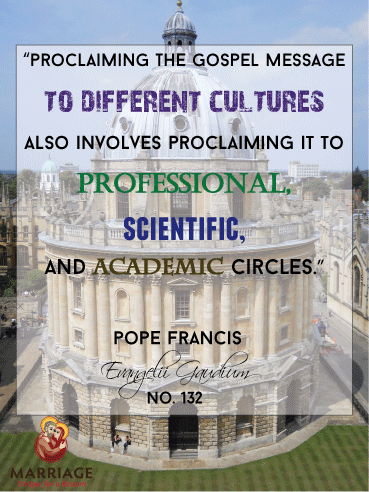
Lessons from Evangelii Gaudium #9
Pope Francis’s Apostolic Exhortation on the proclamation of the Gospel in today’s world, Evangelii Gaudium or “The Joy of the Gospel,” has many points that are relevant to the work of Marriage: Unique for a Reason. This series will explore some of these themes and apply Pope Francis’s words to the culture of marriage and family in the United States.
Culture, Thought and Education (paragraphs 132-134)
Pope Francis writes that “Proclaiming the Gospel message to different cultures also involves proclaiming it to professional, scientific and academic circles” (no. 132). It may be tempting to leave the towers of academia untouched by our missionary efforts, but this would be a mistake. Pope Francis encourages us to develop a “creative apologetics”; a way of demonstrating the interaction of faith and reason and particularly the question of credibility.
St John Paul II wrote an encyclical about Faith and Reason (Fides et Ratio) in 1998. In it, he pointed out that, “the desire for truth is part of human nature itself” (no. 3). There is a certain sense in which this desire for truth is played out in a particularly strong way in “intellectual” circles. There is an almost- separate culture to academia or the professional and scientific world, which means that there is likewise a particular way of sharing the Gospel with those in them. Every authentic culture is open to revelation. As John Paul II put it, “This simple statement contains a great truth: faith’s encounter with different cultures has created something new” (no. 70). Christians who are immersed in professional, scientific and academic circles have a unique calling to call forth the desire for truth from their colleagues and to challenge any assumptions that are in conflict with it.
One of the most simple, yet eloquent ways of living the Gospel in a professional context is showing by one’s life that one’s family takes precedence over professional achievement or monetary gain. A priest who is one of many children told the following story: One day as a teenager, he accompanied his father to the hospital where his father worked, and noted the many BMWs and Lexus’s in the parking lot. He asked whether his dad was embarrassed driving a clunky van—his dad replied that his family was far more important to him than his car. This man’s faith and priority on family is a concrete witness within a professional context.
Archive
Evangelii Gaudium, Marriage and Family: Part Eight
Pope Francis’s Apostolic Exhortation on the proclamation of the Gospel in today’s world, Evangelii Gaudium or “The Joy of the Gospel,” has many points that are relevant to the work of Marriage: Unique for a Reason. This series will explore some of these themes and apply Pope Francis’s words to the culture of marriage and family in the United States.
Person to Person
Every day, Pope Francis says, we are responsible for a kind of simple “informal preaching” to our family, friends and neighbors (no. 127). Sharing the love of Christ with them is our mission. The Holy Father points out that in dialogue, listening is the first step, “when the other person speaks and shares his or her joys, hopes and concerns for loved ones, or so many other heartfelt needs” (no. 128). It is when a person is listened to and respected that they may be open to hearing God’s word from one who is humble and “always willing to learn, in the awareness that the message is so rich and so deep that it always exceeds our grasp” (no. 128).
Christians do not approach others with all the answers. We do not have neat, simple formulas to solve the world’s problems. Our message must never be reduced to platitudes. What the Church has is the message of love and mercy: a God who became man; who suffered, died, and rose again for us. There are as many ways of sharing this message as there are human beings.
Pope Francis focuses on the simple person to person encounters that happen every day. Christians are reminded by this to pay attention to the opportunities of the present moment, the here-and-now. This can be undermined in some ways by too strong a reliance on technology or social media for communication. Technology should be in the service of human relationships, not in replacement of them. There are many reflections on this, even in our own culture, that are worth thinking about. The Holy Father also reflects on this when he addresses the media for World Communications Day every year. He reminds us, “The desire for digital connectivity can have the effect of isolating us from our neighbors, from those closest to us” (“Message for the 48th World Communications Day”).
This week, can your family make a special effort to connect with others in your community? Can you start a conversation about something meaningful by the soccer field, or invite an elderly neighbor for dinner?
Archive
Evangelii Gaudium, Marriage and Family: Part Seven
 Pope Francis’s Apostolic Exhortation on the proclamation of the Gospel in today’s world, Evangelii Gaudium or “The Joy of the Gospel,” has many points that are relevant to the work of Marriage: Unique for a Reason. This series will explore some of these themes and apply Pope Francis’s words to the culture of marriage and family in the United States.
Pope Francis’s Apostolic Exhortation on the proclamation of the Gospel in today’s world, Evangelii Gaudium or “The Joy of the Gospel,” has many points that are relevant to the work of Marriage: Unique for a Reason. This series will explore some of these themes and apply Pope Francis’s words to the culture of marriage and family in the United States.
We Are All Missionary Disciples
“The new evangelization calls for personal involvement on the part of each of the baptized” (no. 120). Pope Francis includes everyone, young and old, in his call for missionary disciples. He reminds us that throughout the New Testament, those who encountered Jesus were changed and sent forth to others.
After being healed by Jesus in the Gospels, the former Gerasene demoniac wanted to stay with and follow Christ with the other disciples. Jesus “would not permit him but told him instead, ‘Go home to your family and announce to them all that the Lord in his pity has done for you’” (Mk 5:19). We, too, are sent home to proclaim the Gospel.
The family is the place we are first called to evangelize, and sometimes it can be the hardest. Why is this? Why does it sometimes seem more difficult to speak of what God has done in your life with your mom, dad, or sibling than with a relative stranger at a retreat? Why can it be harder to tell your own children what God’s relationship means to you than it is to tell children you teach at catechism class?
Perhaps it is because, in our families, we often assume that we know each other better than we do. We may have watched them grow up, or we have grown up under their watchful gaze, and so we assume that they have nothing new to tell us. Or, on the other hand, we are humbled because the people in our family know our faults and have seen our mistakes more than anyone else. Why would they believe what we say about God when they heard us yelling at our brother yesterday about the mess he left in the bathroom? We realize that we need to conform our lives to Christ in order to be credible witnesses.
This week, may we seek to be missionary disciples first within our own families. Then we will be even more empowered by the Spirit to, “Go out to all the world and tell the Good News” (Mk 16:15).
Archive
Evangelii Gaudium, Marriage and Family: Part Six-point-five
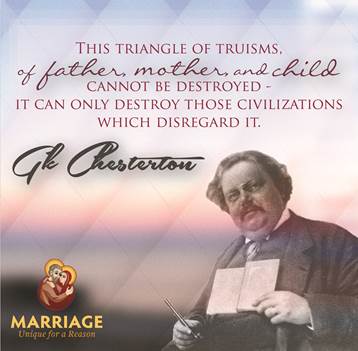 Pope Francis’s Apostolic Exhortation on the proclamation of the Gospel in today’s world, Evangelii Gaudium or “The Joy of the Gospel,” has many points that are relevant to the work of Marriage: Unique for a Reason. This series will explore some of these themes and apply Pope Francis’s words to the culture of marriage and family in the United States.
Pope Francis’s Apostolic Exhortation on the proclamation of the Gospel in today’s world, Evangelii Gaudium or “The Joy of the Gospel,” has many points that are relevant to the work of Marriage: Unique for a Reason. This series will explore some of these themes and apply Pope Francis’s words to the culture of marriage and family in the United States.
A People for Everyone
The Church as the Body and Bride of Christ is saved by Him as one. “No one is saved by himself or herself, individually, or by his or her own efforts. God attracts us by taking into account the complex interweaving of personal relationships entailed in the life of a human community” (no. 113). We are connected to one another.
Perhaps nowhere else is this as clear as in the family; in the family, we are bonded together for life to a number of other people, without any choice in the matter. As G.K. Chesterton put it: “The best way that a man could test his readiness to encounter the common variety of mankind would be to climb down a chimney into any house at random, and get on as well as possible with the people inside. And that is essentially what each one of us did on the day that he was born” (“On Certain Modern Writers and the Institution of the Family”). The people in our families were picked out for us by God, not by us. Even when a child is adopted, or someone is taken in to a family for a time, the mystery of that person always exceeds our limited understanding of them.
Chesterton continues: “Aunt Elizabeth is unreasonable, like mankind. Papa is excitable, like mankind. Our youngest brother is mischievous, like mankind. Grandpapa is stupid, like the world; he is old, like the world. Those who wish, rightly or wrongly, to step out of this, do definitely wish to step into a narrower world” (ibid.). It is in the family that we learn how to navigate the differences between people while maintaining love for them and living with them. When we are living it well, we learn in the family how to “bear with” one another with patience. We learn to place things in perspective and how to get along. We learn how to pray, how to approach God and others for forgiveness, and how to extend mercy to others as well.
These are the lessons that are extended to our parishes and the universal “family of families” which is the Church. Families, Pope Francis and G.K. Chesterton both remind you: God has given you each other precisely that you may journey to salvation together. May God bless that journey!
Archive
Evangelii Gaudium, Marriage and Family: Part Six
Pope Francis’s Apostolic Exhortation on the proclamation of the Gospel in today’s world, Evangelii Gaudium or “The Joy of the Gospel,” has many points that are relevant to the work of Marriage: Unique for a Reason. This series will explore some of these themes and apply Pope Francis’s words to the culture of marriage and family in the United States.
Other Ecclesial Challenges
In this section (nos. 103-104) Pope Francis calls the reader back to a common theme from Pope St. John Paul II’s Pontificate: the genius of women. He writes with admiration of women, who show “special concern … to others, which finds a particular, even if not exclusive, expression in motherhood” (no. 103).
Secular discussions about the relationship between the sexes tend to look at them in terms of power; the Church consistently reminds the faithful that because Jesus Christ was “obedient unto death,” He has turned the whole idea of power around. Scripture teaches:
“The message of the cross is foolishness to those who are perishing, but to us who are being saved it is the power of God. For it is written: ‘I will destroy the wisdom of the wise, and the learning of the learned I will set aside.’ Where is the wise one? Where is the scribe? Where is the debater of this age? Has not God made the wisdom of the world foolish? For since in the wisdom of God the world did not come to know God through wisdom, it was the will of God through the foolishness of the proclamation to save those who have faith. For Jews demand signs and Greeks look for wisdom, but we proclaim Christ crucified, a stumbling block to Jews and foolishness to Gentiles, but to those who are called, Jews and Greeks alike, Christ the power of God and the wisdom of God. For the foolishness of God is wiser than human wisdom, and the weakness of God is stronger than human strength” (1 Cor 1:18-25).
Therefore, since it is the one who most closely imitates Christ, the Crucified One, who is highest in the Kingdom of God, those who seek earthly power are on the wrong track. Pope Francis points this out when he writes that the reservation of the priesthood to males is unchangeable, “but it can prove especially divisive if sacramental power is too closely identified with power in general” (no. 104). He goes on to reiterate that Mary is the most important human being after Christ; she is “more important” than any bishop (no. 104). The Holy Father encourages the pastors of the Church to be mindful of the gifts that women can bring to decision-making in different areas of the Church’s life.
Pope Francis is reminding us of something that we know from experience of family life. As the saying goes, “If mama ain’t happy, ain’t nobody happy.” Mothers have a kind of direct impact on the family dynamic that is exceptional. They have a unique capacity to raise their family up or bring them down; but often this is not acknowledged by the world as a “power.” In fact, a recent study showed this to be true. One of the authors of the study, Deborah Carr, told The Huffington Post: “A wife’s happiness in the marriage has the power to overtake a husband’s marital unhappiness to make his overall life quite pleasant.” Women: use your true powers of attentiveness and nurturing to bring joy to your families!
Archive
Evangelii Gaudium, Marriage and Family: Part Five
Pope Francis’s Apostolic Exhortation on the proclamation of the Gospel in today’s world, Evangelii Gaudium or “The Joy of the Gospel,” has many points that are relevant to the work of Marriage: Unique for a Reason. This series will explore some of these themes and apply Pope Francis’s words to the culture of marriage and family in the United States.
Temptations Faced by Pastoral Workers
This one is for all Church workers! Working in and for the Church is a great service, imbued with meaning, and is often attended by joy. At other times, it can be challenging as we witness and experience the human struggle, weaknesses, and sin that mark us all, lay, consecrated, and ordained.
Often, pastoral workers are tempted to stop reaching out to the world and instead get caught up with internal problems of the Church or diocese. We can experience “a sort of inferiority complex” (no. 79) when we are faced with the skepticism and condescension of the media and secular culture. To all who work in or serve the Church, the Holy Father says, “Let us not allow ourselves to be robbed of missionary enthusiasm!” (no. 80).
The Pope points out that finding people in the Church who are willing to give of their free time is increasingly difficult. He suggests that “people feel an overbearing need to guard their personal freedom, as though the task of evangelization was a dangerous poison rather than a joyful response to God’s love” (no. 81). We are called not only to give to our Church community but also to help others recognize that missionary desire in their own hearts, given to them in Baptism and Confirmation.
Finally, in the section that perhaps is most applicable to the promotion and defense of marriage in America: “The evils of our world—and those of the Church—must not be excuses for diminishing our commitment and our fervor” (no. 84). Pope Francis recalls the words of Pope St. John XXIII who said, “We must disagree with those prophets of doom who are always forecasting disaster” (qtd in no. 84). Rather, we who work in the Church, particularly for the authentic truth of marriage in our culture, must be “fully convinced of victory beforehand” (no. 85), even if this victory should not be visible with any immediacy.
People need God. They need Him more than water! If they exclude Him purposefully, as some in our country appear ready and willing to do, they will only bring suffering. By bearing our crosses as we seek to promote marriage today, we can perhaps help alleviate the future suffering of those who will be harmed in the confusion over the family. In the divine economy, we may be “living sources of water from which others can drink” (no. 86).
Archive
Evangelii Gaudium, Marriage and Family: Part Four
 Pope Francis’s Apostolic Exhortation on the proclamation of the Gospel in today’s world, Evangelii Gaudium or “The Joy of the Gospel,” has many points that are relevant to the work of Marriage: Unique for a Reason. This series will explore some of these themes and apply Pope Francis’s words to the culture of marriage and family in the United States.
Pope Francis’s Apostolic Exhortation on the proclamation of the Gospel in today’s world, Evangelii Gaudium or “The Joy of the Gospel,” has many points that are relevant to the work of Marriage: Unique for a Reason. This series will explore some of these themes and apply Pope Francis’s words to the culture of marriage and family in the United States.
Cultural Challenges
Why does it seem so hard to transmit the Gospel in today’s world? Pope Francis writes about the many challenges of modern culture: relativism, secularism, materialism, indifference. In particular, he writes about how people accept the Church in some ways (her service to the poor) while rejecting her in other ways (many of her teachings). “…[W]e find it difficult to make people see that when we raise other questions less palatable to public opinion, we are doing so out of fidelity to precisely the same convictions about human dignity and the common good” (no. 65). For example, the Gospel that sends us out to feed the poor is the very same Gospel that calls us to chastity.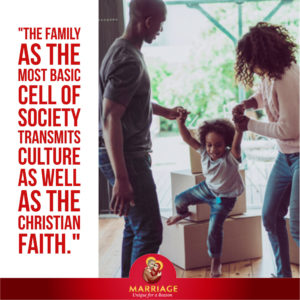
Pope Francis explicitly writes about the importance of the family here: “The family is experiencing a profound cultural crisis,” which is “particularly serious because the family is the fundamental cell of society, where we learn to live with others despite our differences and to belong to one another” (no. 66). He laments modern cultures’ loss of the true nature of love, instead reducing it to “mere emotional satisfaction” (no. 66).
The family as the most basic cell of society transmits culture as well as the Christian faith. Pope Francis points out that “an evangelized culture, for all its limits, has many more resources than the mere sum of total believers” because it “contains values of faith and solidarity” and “possesses a particular wisdom” (no. 68). Countries of a Catholic tradition already have, in a sense, more to work with, and thus simply need revitalization, reminding and purification. Countries of other religious backgrounds or those deeply secularized need people of faith to “spark” new processes of evangelization and help form new cultural movements (no. 69).
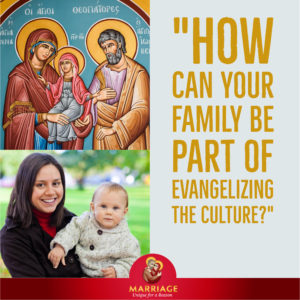 How can your family be part of evangelizing the culture? One example is a group of families who began organizing contra dance and ceili nights for their children and teens. In a culture where the normal idea of middle or high school dances is rap and techno, these families are teaching their children and adolescents dances that have form and set etiquette. Perhaps one day they will be in the position to ask for such a dance to be held at their local school, in place of another type. Please share your own ideas!
How can your family be part of evangelizing the culture? One example is a group of families who began organizing contra dance and ceili nights for their children and teens. In a culture where the normal idea of middle or high school dances is rap and techno, these families are teaching their children and adolescents dances that have form and set etiquette. Perhaps one day they will be in the position to ask for such a dance to be held at their local school, in place of another type. Please share your own ideas!
Thank you for reading the fourth post of our Evangelii Gaudium – Marriage and Family blog post series. We hope you enjoyed it. Please stay updated through our blog and social media sites for future blog post! Click on the image below to be directed to all published articles within the Evangelii Gaudium blog series.
Archive
Evangelii Gaudium, Marriage and Family: Part Three
 Pope Francis’s Apostolic Exhortation on the proclamation of the Gospel in today’s world, Evangelii Gaudium or “The Joy of the Gospel,” has many points that are relevant to the work of Marriage: Unique for a Reason. This series will explore some of these themes and apply Pope Francis’s words to the culture of marriage and family in the United States.
Pope Francis’s Apostolic Exhortation on the proclamation of the Gospel in today’s world, Evangelii Gaudium or “The Joy of the Gospel,” has many points that are relevant to the work of Marriage: Unique for a Reason. This series will explore some of these themes and apply Pope Francis’s words to the culture of marriage and family in the United States.
The Gospel and Finances
In chapter two of Evangelii Gaudium, the Holy Father comments on the crisis of communal commitment by going through a series of “No’s”: “No to an Economy of Exclusion,” “No to the New Idolatry of Money,” “No to a Financial System Which Rules Rather than Serves,” and finally, “No to the Inequality which Spawns Violence” (nos. 53-60).
 All of these statements about money and its place in our lives have implications for marriage and the family. First, on the “economy of exclusion,” Pope Francis writes that by excluding certain persons or groups from access to social and economic opportunities, “we have created a ‘disposable’ culture which is now spreading” (no. 53). The first step in combatting a “disposable” culture must be to acknowledge that from the beginning to the end of life, each human being is precious and irreplaceable. The proper context for this is the family, where the child is first welcomed, and where, on the other end of earthly life, the elderly may be cared for.
All of these statements about money and its place in our lives have implications for marriage and the family. First, on the “economy of exclusion,” Pope Francis writes that by excluding certain persons or groups from access to social and economic opportunities, “we have created a ‘disposable’ culture which is now spreading” (no. 53). The first step in combatting a “disposable” culture must be to acknowledge that from the beginning to the end of life, each human being is precious and irreplaceable. The proper context for this is the family, where the child is first welcomed, and where, on the other end of earthly life, the elderly may be cared for.
Pope Francis notes that in the modern world “we have created new idols… man is reduced to one of his needs alone: consumption” (no. 55). The gap between the rich and the poor keeps widening and the “deified market” becomes “the only rule” (no. 56). The family can counter this trend by remaining as a place where human beings are clearly valued above financial gain or consumption.
A family who chooses and is able to receive the blessing of a large number of children, for example, gives up material comforts for the sake of human beings. Children can be taught to value their characters over their cash and to sacrifice for the sake of others.
“The Pope loves everyone, rich and poor alike, but he is obliged in the name of Christ to remind all that the rich must help, respect and promote the poor” (no. 58). Families are called to foster generosity in their children: awareness of the privileges they have and the obligations such privileges entail. Parents must model respect for the poor and solicitude for those in need.
Parents are also called to educate their children about the larger systems that affect family life, and to help them develop compassion for the poor around the world in concrete ways. In many places evil is “embedded in the structures of society” (no. 59). Families cannot ignore the larger societal trends and policies that keep the poor poor and the rich rich. They must not be complacent about the desire for justice. Pope Francis’s words on the “economy of exclusion” have implications for every family
Thank you for reading the third post of our Evangelii Gaudium – Marriage and Family blog post series. We hope you enjoyed it. Please stay updated through our blog and social media sites for future blog post! Click on the image below to be directed to all published articles within the Evangelii Gaudium blog series.
Archive
Evangelii Gaudium, Marriage and Family: Part Two
 Pope Francis’s Apostolic Exhortation on the proclamation of the Gospel in today’s world, Evangelii Gaudium or “The Joy of the Gospel,” has many points that are relevant to the work of Marriage: Unique for a Reason. This series will explore some of these themes and apply Pope Francis’s words to the culture of marriage and family in the United States.
Pope Francis’s Apostolic Exhortation on the proclamation of the Gospel in today’s world, Evangelii Gaudium or “The Joy of the Gospel,” has many points that are relevant to the work of Marriage: Unique for a Reason. This series will explore some of these themes and apply Pope Francis’s words to the culture of marriage and family in the United States.
From the Heart of the Gospel
Pope Francis writes in this section about how the deep and beautiful truths of the Gospel are often not communicated effectively in the modern world because of the focus of mass communications on the controversial or difficult moral teachings. He calls the pastoral ministers of the Church to concentrate instead on, “the essentials, on what is most beautiful, most grand, most appealing and at the same time most necessary” (no. 35).
 Christian Marriage, which takes into account the basic human desire to love and be loved, to give life and receive it, is certainly one of the most beautiful and appealing aspects of the Gospel. Marriage is essentially a response to a love that precedes it— God’s love. “For God so loved the world…” (John 3:16) that Christian spouses are able to love one another with His own love.
Christian Marriage, which takes into account the basic human desire to love and be loved, to give life and receive it, is certainly one of the most beautiful and appealing aspects of the Gospel. Marriage is essentially a response to a love that precedes it— God’s love. “For God so loved the world…” (John 3:16) that Christian spouses are able to love one another with His own love.
The Gospel transforms daily life; it enlivens our hearts with hope and trust in God. We experience the Holy Spirit through joy and peace, generosity and service. God is visible in gatherings of families—children running around playing while the adults converse, for example, and in religious communities—working together with smiles and unruffled patience. These are witnesses to the faith that are “most appealing and at the same time most necessary.”
Why most necessary? Because there is fear in the modern heart. Getting married and raising a family based on Christ’s love has always been a daunting though enriching task embraced by many young people, but today many young people are delaying marriage or even not getting married at all. The most recent Pew research study, for example, showed that a record number of young adults in America are unmarried and that many young people do not see marriage as a priority. Cohabitation has increased, more children are born out of wedlock, and divorce is fairly common. 
In these circumstances, the Gospel of the Family in the context of “the harmonious totality of the Christian message” (no. 39) is ever more necessary. Men and women need to hear and see that God can do even what seems impossible: bond two flawed human beings together for life, in love and fidelity. This is “the fragrance of the Gospel” (no. 39). Married couples, young and old, share your love visibly and inspire young people with your witness of fidelity!
Thank you for reading the second post of our Evangelii Gaudium – Marriage and Family blog post series. We hope you enjoyed it. Please stay updated through our blog and social media sites for future blog post! Click on the image below to be directed to all published articles within the Evangelii Gaudium blog series.
Archive
Evangelii Gaudium, Marriage and Family
Pope Francis’s Apostolic Exhortation on the proclamation of the Gospel in today’s world, Evangelii Gaudium or “The Joy of the Gospel,” has many points that are relevant to the work of Marriage: Unique for a Reason. This series will explore some of these themes and apply Pope Francis’s words to the culture of marriage and family in the United States.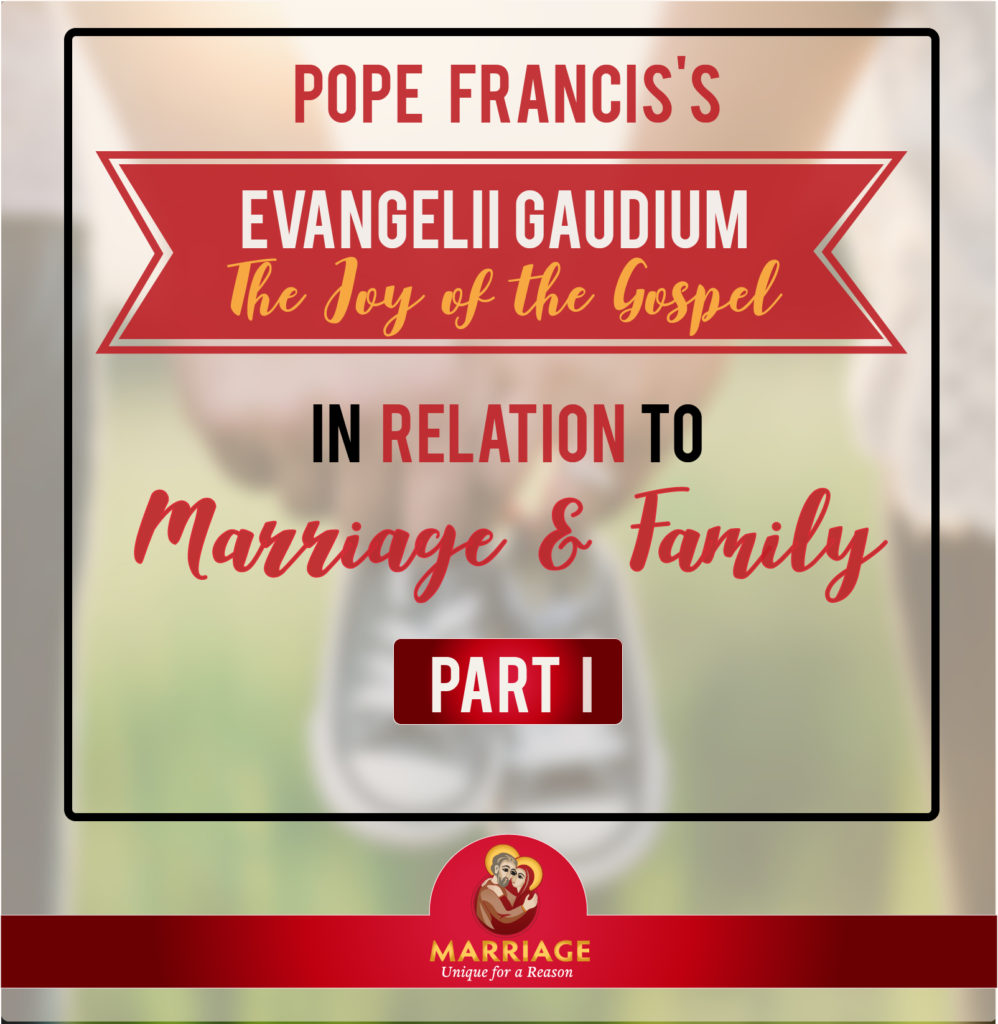
A Church Which Goes Forth
God calls His people to go forth, to proclaim the Gospel to all the ends of the earth. We do not go as slaves in drudgery, but as Jesus’ friends in joy and peace. “The Gospel joy which enlivens the community of disciples is a missionary joy” (no. 21). A soul set free by Christ is enlivened by the Holy Spirit to proclaim His message; we see this all over the Gospels, from the Samaritan woman at the well (John 4) to the man born blind (John 9).
In one of his homilies, the Holy Father noted, “The great Paul VI said that you cannot advance the Gospel with sad, hopeless, discouraged Christians. You cannot… Often Christians behave as if they were going to a funeral procession rather than to praise God, no? And this joy comes from praise…” We are called to be people of praise, and thus of joy. Our joy should be catching.
Pope Francis continues, “An evangelizing community gets involved in word and deed in people’s daily lives; it bridges distances, it is willing to abase itself if necessary, and it embraces human life, touching the suffering flesh of Christ in others” (no. 24). Where is this seen the most? In the family.
Family as the domestic Church, rooted in the Sacrament of Marriage, is a primary evangelizing community. In this two-become-one-flesh relationship, each of the spouses in a sense evangelizes the other, but as a communion, the two together evangelize their family. Think first of the way that moms and dads love their children. Is there any better example of an evangelizing community?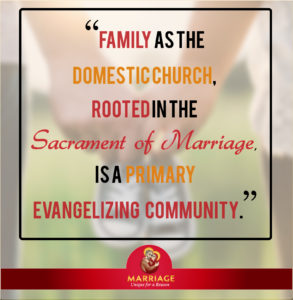
1. It bridges distances: The distance between generations is bridged by the love of parents for their children, and for their children’s children, and so forth. Wisdom is passed on, guidance offered.
2. It is willing to abase itself: Any parent could offer numerous stories of times where they have humbly submitted to their lack of control over their child’s behavior. Parents who refuse to take credit for their children’s good behavior, talents or abilities, but instead are content to allow their child to shine.
3. It embraces human life: Children are lovingly welcomed into the family by a mother and a father. Whether through conception, adoption, foster care, or even simple hospitality, the home of a husband and wife is open to others.
4. It touches the suffering flesh of Christ in others: Before any other experience of human care and compassion, the infant receives all he or she needs from mother and father. From the first cold to broken bones, to even mental illness or addiction, parents are the first responders to the suffering of their children.
And as for taking on “the smell of the sheep” (no. 24) … need any more be said?
Thank you for reading the first post of our Evangelii Gaudium – Marriage and Family blog post series. We hope you enjoyed it. Please stay updated through our blog and social media sites for future blog post! Click on the image below to be directed to all published articles within the Evangelii Gaudium blog series.


